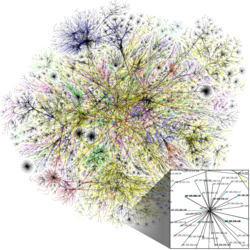This article needs to be updated.(June 2015) |
| Internet |
|---|
 |
| |
Thailand's connection to the Internet began in 1987 via the Australian Research and Education Network using UUCP and SUNIII [1] which transformed to full TCP/IP in 1992 to UUNET. [2] This marked Thailand as an early participant in bringing the Internet to Asia.
Contents
- Internet domain names
- Internet backbones
- International and domestic bandwidth
- International gateways (IP transit)
- Domestic Internet eXchange
- Internet eXchange point
- Internet service providers
- Wired
- Wireless
- Internet data centers
- Internet censorship
- Single Internet gateway
- Internet surveillance
- See also
- References
- Further reading
- External links
As of 2021, Thailand has made significant progress, with an 85% internet penetration rate [3] and according to Ookla's insight in November 2022, Thailand ranked the fourth in the world for the fastest fixed broadband internet, with the median download speed of 205.63 Mbps. [4] This places Thailand right behind Chile, China, and Singapore.
By 2023, the internet penetration rate brought notable changes to Thailand's approach to news and media. The Reuters Institute for the Study of Journalism reported a shift towards digital media as a key source for political news and discussions. [5] Newer media outlets started to challenge traditional news reporting, altering long-standing journalistic practices. This change is reflected in the growing preference for getting news from online platforms such as Facebook, YouTube, and TikTok. [6]
The majority of broadband internet access uses Asymmetric Digital Subscriber Line (ADSL) and VDSL. Some areas are covered by cable modems (using Docsis), G.shdsl and fibre to the home (FTTH). Consumer broadband internet bandwidth ranges from 10 Mbit/s to 300 Mbit/s (Up to 1 Gbit/s in Bangkok, Chiang Mai, Pattaya, Phuket). Medium and large businesses use leased lines or Ethernet Internet/MPLS where fiber optic cables link many office buildings in the central business district areas such as Bangkok's Sukhumvit, Silom, and Sathorn areas to the Thailand internet backbone.
A 3G UMTS/HSDPA network was launched in Bangkok and vicinity in December 2009 with speeds up to 7.2 Mbit/s on the 2100 MHz band. In late-2011, Telephone Organization of Thailand released 3G on HSPA+ technology covering all areas in Bangkok with speeds up to 42 Mbit/s. Major mobile network operators in Thailand also have released their 3G services at around the same time on the 850 MHz and 900 MHz bands with the same technology and connection speed. FTTH with speeds up to 1 Gbit/s is available in limited areas in major cities, including Bangkok, Phuket, and Chiang Mai. 5G Cellular services were offered by AIS and True Move starting in 2020.
Thailand saw a rapid growth in the number of broadband users in 2005 with the initiation of unmetered broadband in 2004. [7] There are 3,399,000 (2012) internet hosts in Thailand, the highest in Southeast Asia. [8]
A 2013 study found that Thais spend an average of 16 hours on the internet per week. [9]